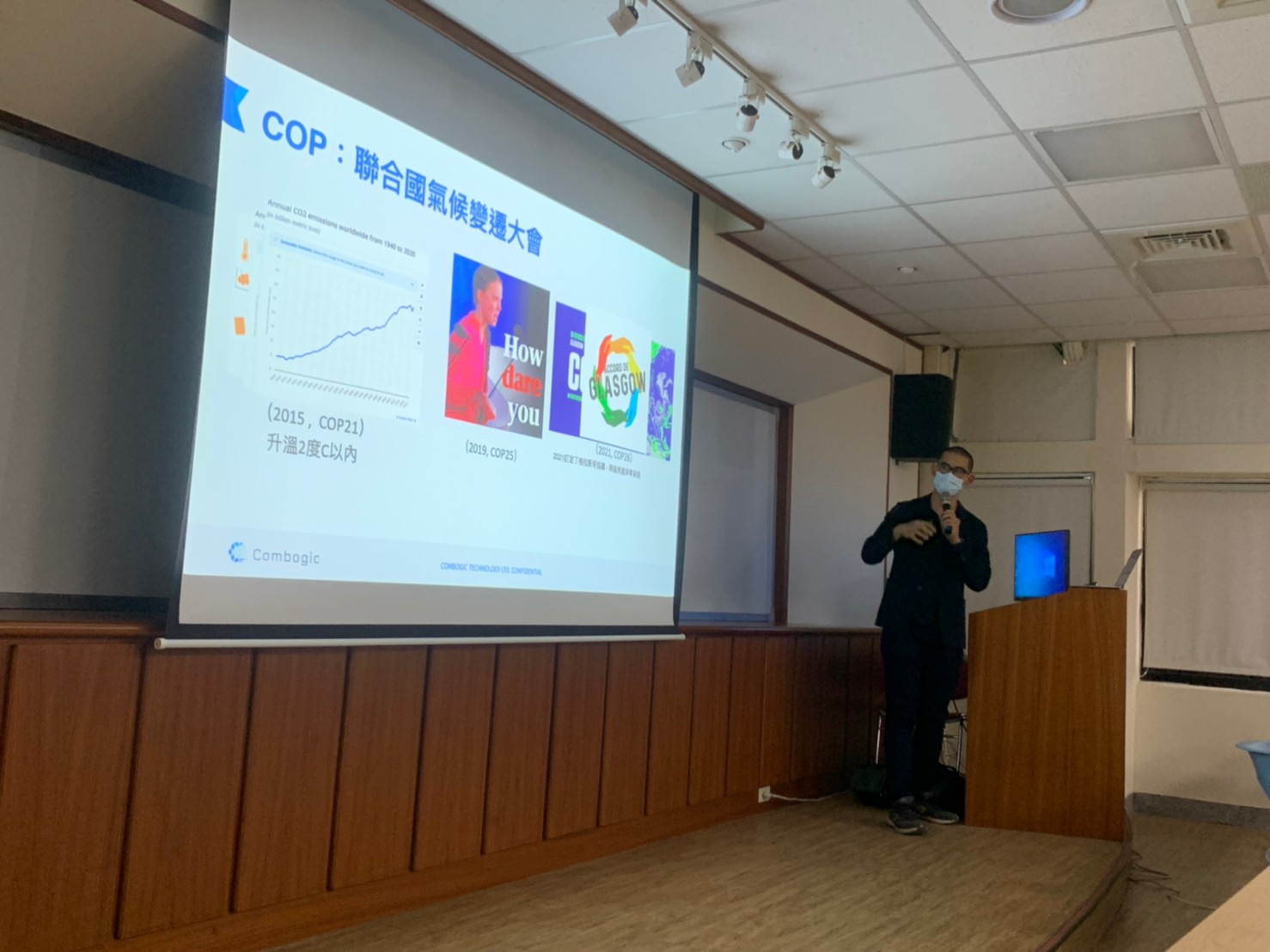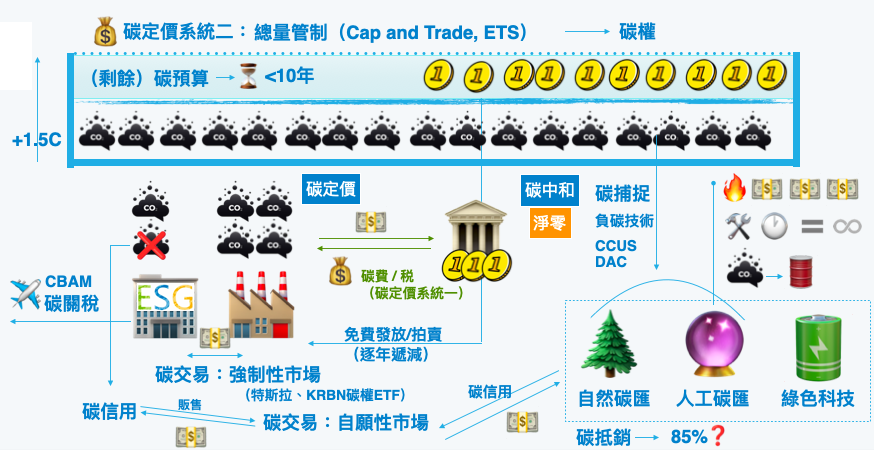COP27, what's going on?
2022-11-11
COP27 is not very calm yet: the agenda of climate compensation, the dissatisfaction of social activists... What are the highlights of this COP? What's the point?
COP Background: United Nations Framework Convention on Climate Change (UNFCC)
The United Nations holds a world conference every year to discuss how the world should respond to climate change and global warming. The name of this conference is "Conference of Parties" (COP). COP27 is the 27th UN climate conference.
Participating in the COP consists of signatories to the 1992 United Nations Framework Convention on Climate Change (UNFCCC), which includes all UN member states, plus Palestine, the Cook Islands, Niue, and The Holy See participating as treaty observers, in total 197 parties.
Since the UNFCCC was signed in 1992, many well-known international consensus on climate action has come from COP conferences, such as:
- 1997 COP3 The Kyoto Protocol, establishing a consensus that "greenhouse gas levels must be stabilized at a certain level"
- 2009 COP15 The Copenhagen meeting put forward national greenhouse gas emission reduction targets for 2020, and rich countries pledged to provide climate finance assistance to reach the standard of 100 billion US dollars per year after 2020 (unfortunately not achieved)
- 2015 COP21 The "Paris Agreement" was signed, which established the goal of "controlling the global average temperature increase to within 2°C of the pre-industrial level before the end of this century."
- The 2021 COP26 "Glasgow Climate Agreement", for the first time, included "phasing down fossil fuels" into the final document and established a 2050 net-zero consensus.
However, the COP has also been criticized as a greenwashing conference because its political mediation and inconclusive meetings. Therefore, whether COPs can achieve effective international consensus and real action is the focus of governments and civil society.
COP27 will be held for two weeks from November 6 to November 18, 2022 at the Red Sea resort of Sharm el-Sheikh, Egypt.
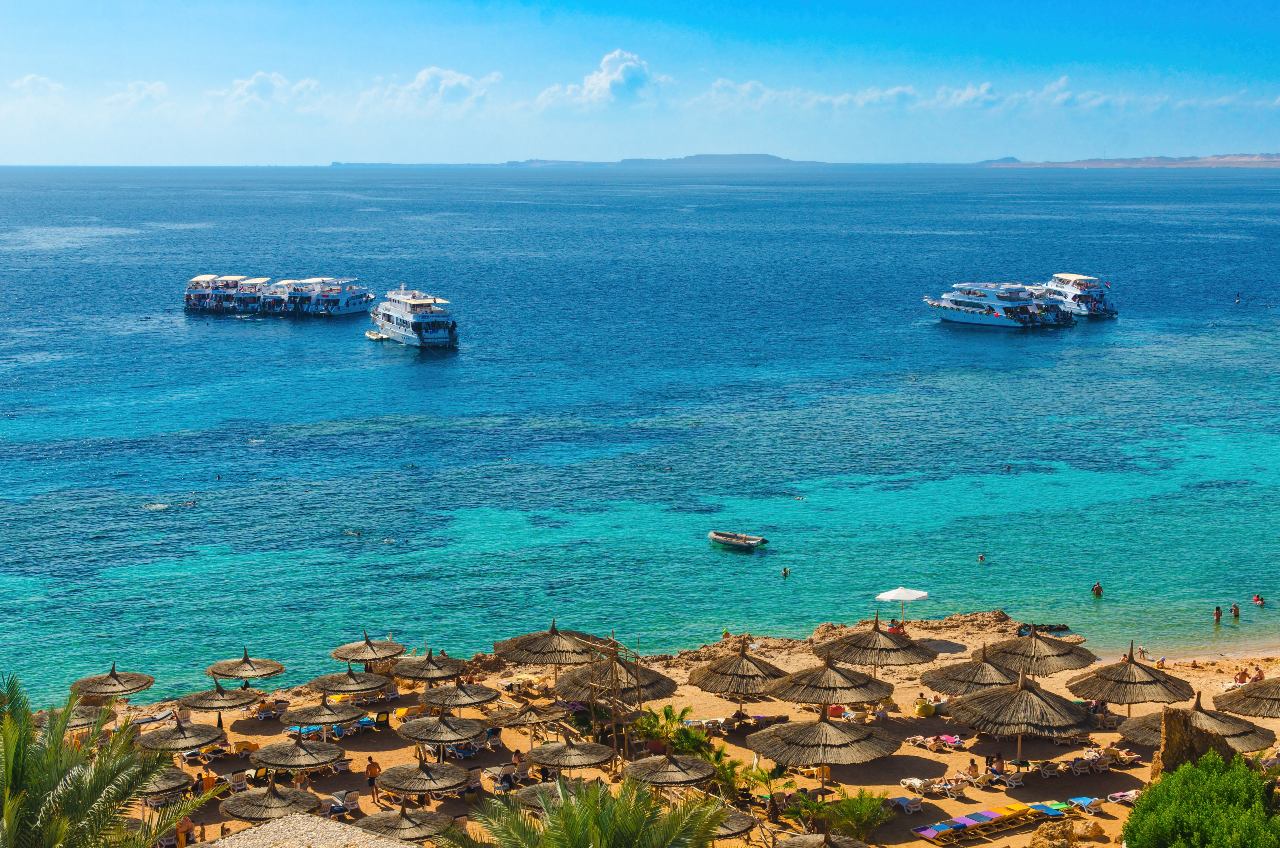
What is the special significance of COP27?
2022 is a year full of climate disasters. As Africa is home to many climate-affected countries, it is of special significance to host COP27.
"The work ahead of us is enormous, as massive as the global climate shock we have seen... A third of Pakistan is flooded, Europe encountered hottest summer in 500 years, Philippine smacked, Cuba in darkness... In the US, Hurricane Ian also brutally reminds us that no country, no economy, is immune to the crisis of climate disasters." UN Secretary-General António Guterres at COP27 speech.
Because of the climate disaster background in 2022 and the location of this year's venue, what COP27 can achieve on climate justice issues is the biggest focus of this year's conference.
While the most recent Intergovernmental Panel on Climate Change ( IPCC ) report still states that we are heading to the critical point. "COP27 is critical, but we still have a long way to go, " said UN Secretary-General António Guterres.
Why is COP27 so controversial?
This year's COP27 has not been quiet. When arranging the agenda, the parties fought back and forth on whether to include "Loss and Damage" on the agenda, resulting in a delay in the start of the meeting.
The fact that COP27 was held in Egypt was also criticized.
On the one hand, Egypt has no clear net-zero carbon emissions route of its own. Its latest National Determined Contribution (NDC) submitted was rated as "Highly Insufficient" and was deemed by Climate Action Tracker . "...lack of transparency, making any quantitative assessment very difficult...the local government does not need to implement any policy changes , can easily meet its latest soft carbon reduction targets.”
On the other hand, it is because of the poor record of basic human rights issues in Egypt. At least 65,000 political prisoners remain in prison, according to estimates by the Arab Network for Human Rights Information (ANHRI).
Egypt human rights advocate Mona Seif criticized: "the ones who actually give a damn about the planet's future are those languishing in prisons"
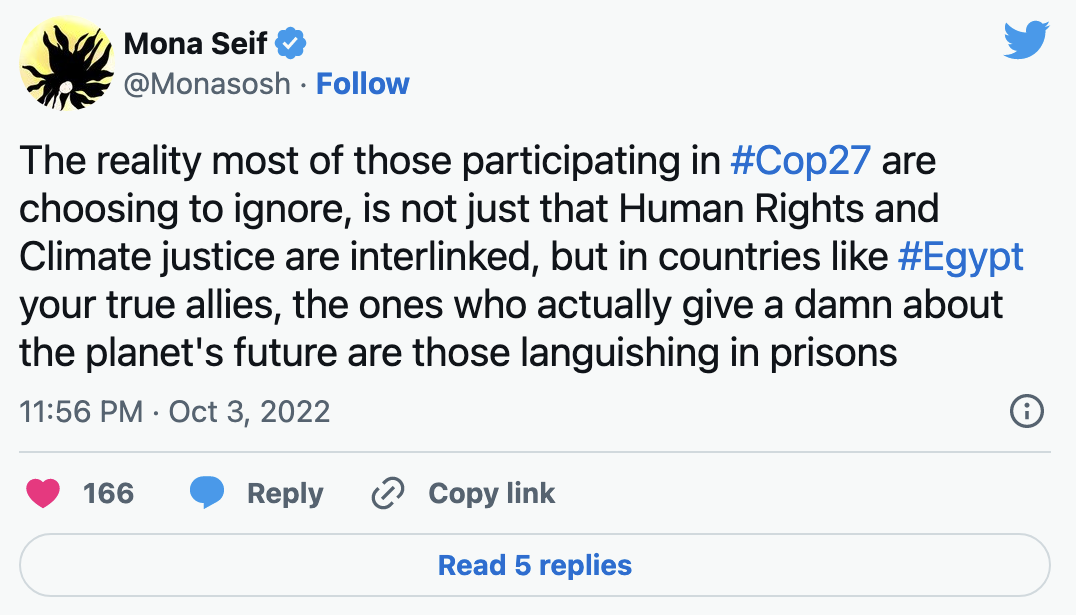
The strict control of public demonstrations have is also controversial. "The space for civil society will be extremely limited," said Greta Thunberg, a Swedish environmentalist. "It is important to leave some space for those who need to go there. The voices of the demonstrators will be hard to hear."
That's why some climate justice advocates, including well-known Canadian journalist Naomi Klein, called COP27 the "Carceral Climate Summit".
COP27 Key Take-aways
Loss and Damage
"Loss and Damage" is the most closely watched topic at this year's COP27.
As the major carbon emitters, rich countries are the main causes of climate change, but climate-affected countries are all small countries with very little carbon emissions, hence the climate injustice. Affected countries believe that rich countries should compensate for the "loss and damage" of the affected countries, and this compensation is named "Loss and Damage Fund".
In fact, as early as 1991, the Alliance of Small Island States has publicly called on the international community to provide a compensation mechanism for climate-affected countries. At the 2009 COP15 Copenhagen meeting, rich countries also pledged to provide climate finance, starting from 2020 to provide 100 billion US dollars a year to help developing countries fight climate change. However, this promise has not been fulfilled.
At the COP26 Glasgow meeting in 2021, developing countries once again proposed that a "Loss and Damage Fund" should be established, but this was again opposed by advanced countries.
In climate justice discussions, "funding" is the hardest point of contention. The IPCC estimates that the world still needs 46 trillion dollars of related investment per year to have a chance to reverse the climate change situation, which is 36 times the current climate investment of various countries. Egypt's Environment Agency Minister Yasmine Fouad also told COP27 that Africa still needs 41.6 trillion of funds to deal with climate shocks before 2030. In the next few years, African fish and crop harvests will be significantly affected by climate, while sea level rise will affect 116 million population.
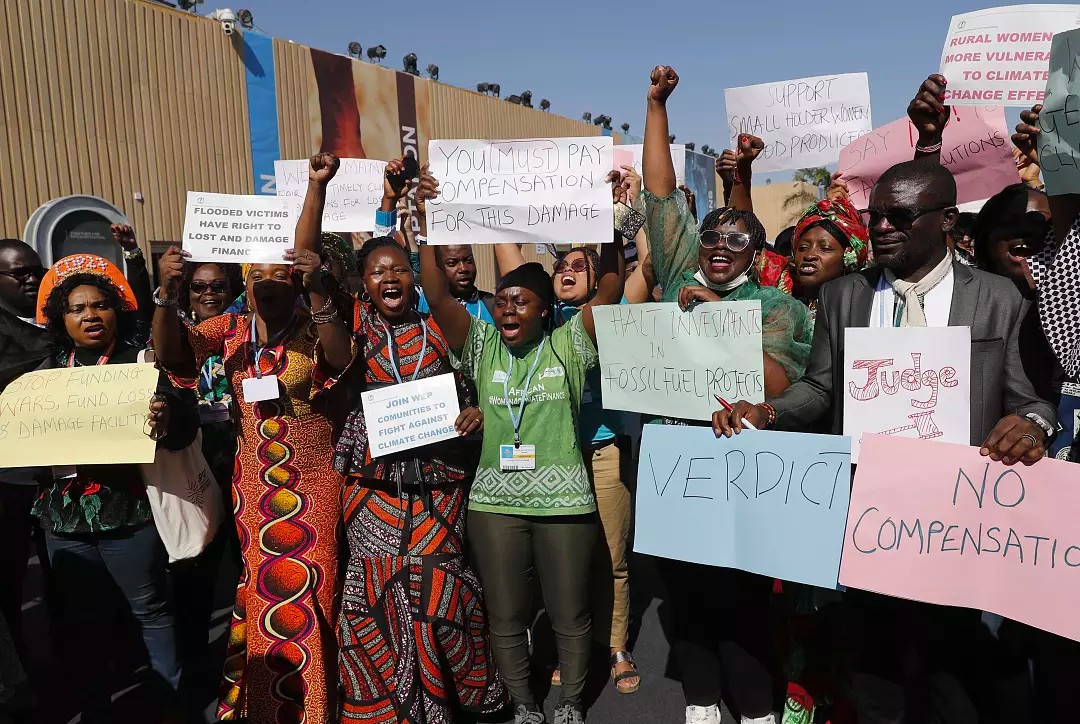
Disaster-affected countries are damaged by climate change caused by the carbon emissions of rich countries, and of course they should be compensated. However, rich countries are also worried that once the compensation is established, it will open the door to endless climate litigation.
After several struggles this year, the issue of Loss and Damage has finally been placed on the official agenda. The community is closely watching what the final outcome will be.
Energy Crisis and Trust
It has been nearly a year since the Ukrainian-Russian war. Putin closed the "North Stream 1" natural gas pipeline as a means of retaliation for the Western collective economic sanctions.
Natural gas is an important transitional means for Europe's energy transition. Europe is facing this threat, coupled with the rise of raw materials and inflation caused by regional conflicts, epidemics, and war factors, and public grievances are everywhere. Many countries are considering delaying the green energy process, or even extending the retirement of coal-fired power plants.
Europe used to be the early stage of energy transition and net-zero carbon reduction. How to stabilize its performance under the challenges of internal and external troubles will be the key to this COP27.
Key three: Accelerate the net-zero schedule
Swiss Research Shows that the world is not on the right path to net-zero emissions by 2050.
The United Nations Environment Programme (UNEP) just released Emissions Gap Report 2022 that 2021 The annual global greenhouse gas emission is as high as 52.8 billion tons of CO2e, which is higher than that in 2019 before the epidemic. The report also predicts that if the current situation continues, global warming will reach 2.8°C by the end of this century, which is higher than the 2.7°C estimated last year.
Furthermore, even if all countries reach the submitted National Self-Determination Contribution (NDC), they can only control the temperature rise within the range of 2.4~2.6℃.
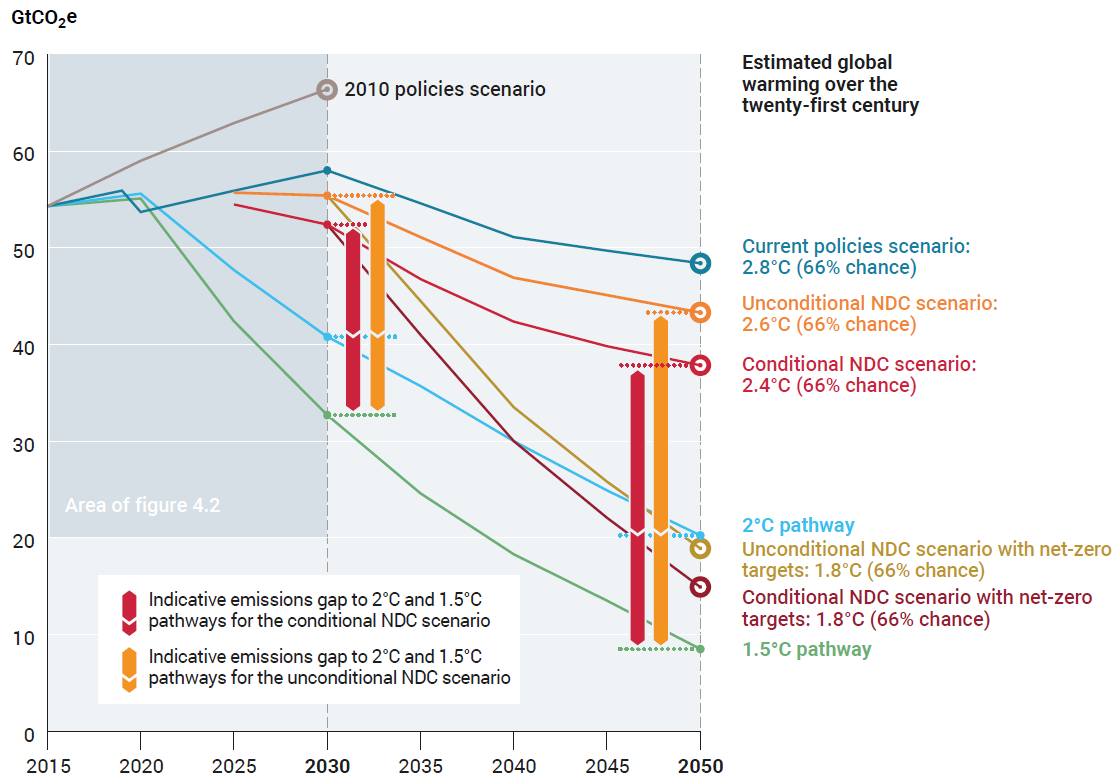
Nationally Determined Contributions (NDC) are the annual carbon reduction goals that each country has to submit by itself, and explain how the country will achieve it. For example this one is the Egyptian version.
The Climate Action Tracker also tracks and scores NDCs submitted by countries every year. After the last COP26, only 28 countries submitted their submissions in 2022 this year, of which only 5 countries have more ambitious carbon reduction targets, which in total will only reduce 500 million tons of carbon dioxide, which is less than 1% of global carbon emissions.
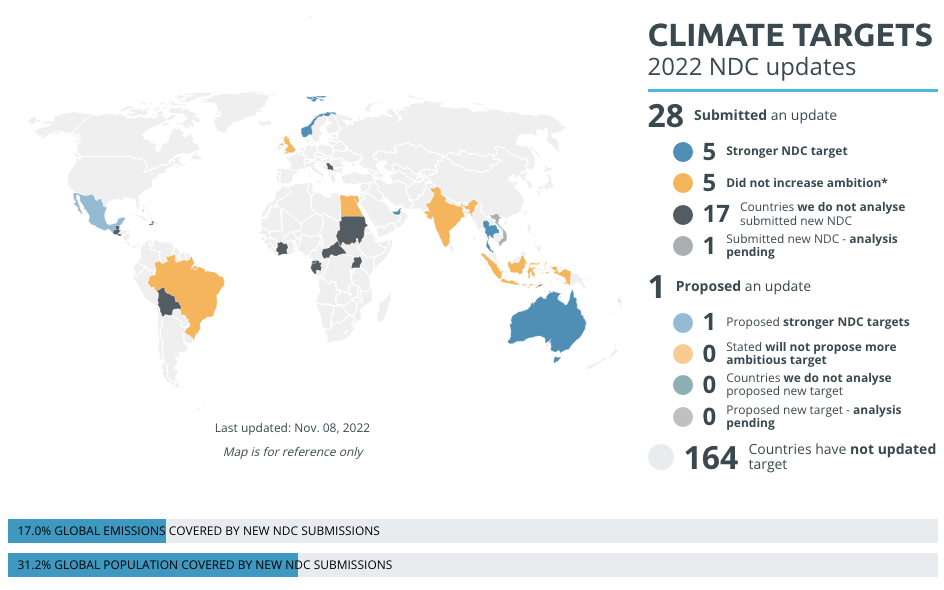
"We are on the highway to climate hell with one foot on the gas pedal." warned UN Secretary-General Antonio Guterres.

